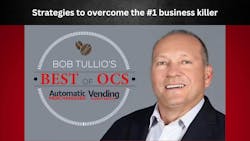How undercapitalization can kill your convenience services business, and how to fix it
As one innovative tech supplier told me recently, capital is like oxygen for a business. Without it, your hopes, your dreams and your business are dead. As an operator who has experienced undercapitalization firsthand, I can assure you: it is a stressful existence that requires a special level of perseverance and a willingness to engage in “guerrilla financing.”
“Marker please”
While I felt like the lack of capital was our own unique problem, even industry legends — proven entrepreneurs — have admitted that undercapitalization was a challenge from time to time. That challenge had them waiting for the mailman and the big checks from big customers that were scheduled to arrive.
Trouble finding a bank
In a recent episode of Automatic Merchandiser’s Vending & OCS Nation podcast, Judson Kleinman of Corporate Essentials said his company turned a corner when financing finally became available. Kleinman noted that while he wrote a good business plan, he could not get banks to loan him money.
For Kleinman, it took a combination of online sales, which allowed him to collect quickly, and the rapid growth of pantry service, which generated significant revenue, to move his company to the next level.
Creative but distracted
Jim Brinton, founder of Avanti Markets and Evergreen Refreshments, also shared how he faced similar challenges brought on by his own entrepreneurialism in another podcast episode. “I got very distracted early on in this business. I started in traditional vending. and then in my early years, I got involved in concessions, a small little restaurant, food service operations and a disco that turned into a nightclub. I looked at all these things and said, ‘What is supporting this?’ It was my vending business,” said Brinton, who came to the realization that vending itself was capital-intensive, and he needed to direct his entire focus on that business.
“You need to control your cash,” he said. “I made some mistakes when interest rates were 22% and 23% in the early ‘80s. I wasn’t saying no, and the equipment people were financing me and selling equipment to me as I continued to grow my business. But I didn’t really quite understand the economics to support those types of high interest rates. Something was going to have to suffer, and my business almost did — not having enough cash to pay all the bills. I weathered the storm, got through it, but learned a very valuable lesson there.”
Advice from Jim Brinton
What advice does Brinton offer to new operators?
“It’s very simple. Most people have way more enthusiasm than cash,” he said. “The reason that businesses fail in this industry is because they are undercapitalized. Before they get into this industry and before they take that plunge, they need to have a full runway of what their expectations are and where they really need to go, whether it’s a sales figure or a profit number, so that they know what is going to be needed capital-wise to get to that number. If they haven’t done their homework, what is going to happen before they can get to one of those two numbers, they’re going to be starved capital-wise. No matter what they do or how much enthusiasm they have, it just has a governing effect, and they’ll lose interest and, unfortunately, many times lose their business.”
That ability to weather the storm often defines the difference between those who succeed and those who fail. How does an operator weather the storm?
Here is what we did as an operator. Note: it’s not easy.
- Spend as much effort finding a bank as you do finding new accounts. Network the banking community. If an accountant can connect your company with a banking relationship, be prepared to switch accountants. Ask your local chamber of commerce, golf buddies and Rotarians to introduce you to their banker.
- Be diligent about accounts receivable. You need to get that money collected.
- Find private individuals who know you, trust you and are interested in a good investment. If the prime rate is 5%, offer them 10% with a two to three-year payback — first year interest only. Quick and easy. It buys you some time. When you pay them back, they always come back to the well and often introduce you to others.
- If you must, find a business partner. Ideally, find a partner who has something to offer beyond capital alone. Owning 75% of something beats owning 100% of nothing.
Controlling costs is obviously important. The best way to avoid an early cash-flow crunch: start the business with twice as much cash as you think you need. Getting your business off the ground is more expensive than you think.
What ultimately saved my company was a government mandate that had major banks finally loosen the reins after the 2008 financial crisis. At last, we received the capital we needed, which led to an incredible run of growth and profitability, all leading to a very happy ending: the sale of the business in 2017.
About the Author

Bob Tullio
Bob Tullio is a content specialist, speaker, sales trainer, consultant and contributing editor of Automatic Merchandiser and VendingMarketWatch.com. He advises entrepreneurs on how to build a successful business from the ground up. He specializes in helping suppliers connect with operators in the convenience services industry — coffee service, vending, micro markets and pantry service specifically. He can be reached at 818-261-1758 and [email protected]. Tullio welcomes your feedback.
Subscribe to Automatic Merchandiser’s new podcast, Vending & OCS Nation, which Tullio hosts. Each episode is designed to make your business more profitable.

